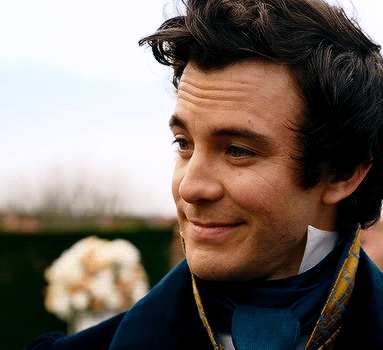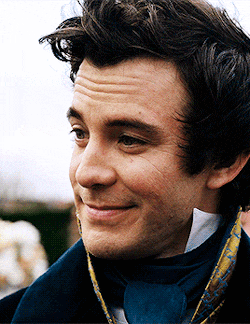.poly app.
PLAYER INFO
Name: Lausanne.
Age: 31.
Contact:![[plurk.com profile]](https://plurk.com/favicon.ico) blackspire
blackspire
Current Characters: N/A
CHARACTER INFO
Name: Benedict Bridgerton.
Journal:![[personal profile]](https://www.dreamwidth.org/img/silk/identity/user.png) sketchbookings
sketchbookings
Age: 27.
Appearance: Here.
Canon: Bridgerton.
Canon Point: Post Season 1.
History: Here.
Abilities:
Benedict has all the talents practiced by well-bred young men of his time. He's got impeccable etiquette, he's trained in the art of fencing, and he's quite good at shooting a pistol. Along with this, he's reasonably good at riding horses, too.
Questionnaire:
Samples:
Text Sample
Log Sample #1
Log Sample #2
Why are you interested in this game?
I'm really interested in the "character growth" aspect of the game, as that's one of my favourite things to explore when writing a character. I'm also excited to see how that translates to a character like Benedict, who outwardly seems like he's close to the end of his journey but has so many inner revelations still to make.
Name: Lausanne.
Age: 31.
Contact:
Current Characters: N/A
CHARACTER INFO
Name: Benedict Bridgerton.
Journal:
Age: 27.
Appearance: Here.
Canon: Bridgerton.
Canon Point: Post Season 1.
History: Here.
Abilities:
Benedict has all the talents practiced by well-bred young men of his time. He's got impeccable etiquette, he's trained in the art of fencing, and he's quite good at shooting a pistol. Along with this, he's reasonably good at riding horses, too.
Questionnaire:
1. What do they care deeply about? What kind of loyalties, commitments, moral codes, life philosophies, passions, callings or spirituality and faith do they have? How do these tend to be expressed?
The most obviously important thing to Benedict is his family. The Bridgertons seem to be an anomaly in that regard - despite the size of their family, and their very high social standing in the aristocracy, they all have a deep regard for family. Though Benedict is more subdued than his siblings when it comes to making great shows of his loyalty, there are clear examples of it. He expresses this commitment by standing at their side whatever the case This can be seen when he doesn’t hesitate to be his brother’s second at an illegal duel, when he accepts that, should his brother die in said duel, he will have to assume the responsibilities of being the head of the house, or even when his younger brother was caught in scandal and Benedict stood by his side support. Benedict’s care for his family is extended to more private moments, as well, such as when he sits with one of his sisters and listens to her discuss her own desires from life, without judgment (and letting her know she has his support in whatever she does).
While Benedict feels a strong sense of duty and responsibility to both his family and his social status, the obligation that comes with being a Bridgerton is the cause of a sort of moral dilemma. Benedict has a passion for art, and while he’s good enough to be praised by a proper artist, it’s clear he’s holding himself back, whether by burning his sketchbook or criticizing his own work. His desire to be a part of something outside of London’s society is all the more evident at the way he seems to come to life when he steps into that world. Benedict’s personality shifts into something a little more daring and a little more playful, as opposed to the almost aloof detachment he seems to display at Society events. He’s at a crossroads with how to reconcile the life he wants with the life he has, only just starting to explore what opportunities exist for him.
2. What kind of person could they become in the future? What are some developmental paths that they could take: best, worst, most likely?
On paper, Benedict is already the sort of person most people strive to be. He’s kind, he’s got a good education, he’s polite, and he’s talented. And while all of that is great, it’s unlikely that he’ll find who he’s meant to be until he learns how to have confidence in himself and his actions. Benedict has the potential to do great things with his art, and, through that, a happiness where he doesn’t feel at odds with who wants to be and who he thinks he should be.
The best path that Benedict could take for himself would to be honest with what he wants. He could recognize that his family would support him in his choice, and that doing something that brings him joy would help him find the direction he’s been looking for. Knowing where his happiness lies and taking control of that could bring him the sense of belonging that he craves.
The worst path would be, of course, the complete opposite. With such a strong sense of duty, Benedict could easily let take over his life. He could fall into the idea that branching out from what he’s known will disappoint his family, or, worse, bring them a scandal. Benedict wouldn’t be able to forgive himself if he brought them some kind of shame. Of course, following the life that’s expected of him would make him miserable. As he’s already a bit detached from the aristocracy, it could make him withdraw into himself even more.
The most likely path for Benedict errs on the side of the worst one, though not so extreme. It’s probable that he will continue to struggle with his internal dilemma of following his heart and fulfilling his self-enforced obligation. His loyalty to his family would win out, as it always will regardless of his situation, but he’d see that loyalty goes both ways. Once some drastic measure brings his true feelings to light, his family will champion him, but it will be a bumpy road for him to own that.
3. How do they behave within a group? What role(s) do they take? Does this differ if they know and trust the group, versus finding themselves in a group of strangers? Why?
When it comes to how Benedict is in a social setting, it doesn't so much depend on whether or not the people are strangers, but rather the circumstances surrounding the gathering.
As previously stated, when Benedict is at a party or event that's not part of The Ton, he's much more easy going. The first time he arrives at the home of Lord Granville, he finds a group of people - men, women, people of all social standings - gathered around sketching or painting models. The atmosphere is much more relaxed than what Benedict is used to, and while he's momentarily hesitant (as anyone would be while being confronted with something new), Benedict relaxes quite quickly. He accepts a cigarette from a stranger and immediately gets to sketching. Up to this point, he's not really shown his drawings to anyone, let alone other artists. Benedict very easily forgets himself when he's in the company of people who make no fusses, a thing which is extremely evident at the next party he attends hosted by Granville. Benedict himself gives into his whims and behaves very freely, engaging in the open with two women, amidst others enjoying much the same liberties. When there's no room for judgment or propriety, Benedict is able to shed that burden himself.
At more formal events, Benedict is absolutely the picture of the Polite Gentleman, but he doesn’t overextend his pleasantries. At larger parties, Benedict is usually seen standing around the edges as he watches the others enjoy themselves, or, if he should happen to be talking to someone, it’s usually a family member (though, sometimes, such as during the picnic scene, Benedict even distances himself from what the family is doing). He takes the opportunities to leave early when they present themselves. In sharp contrast to the more relaxed settings, he acts almost uncomfortable in his own skin. Even when Benedict sees Granville and that crowd at society parties, Benedict is nervous to have both sides of his life overlap, as if the more liberal side of him is something he feels ashamed of.
4. What do they need and want out of relationships, and how do they go about getting it?
In a relationship, Benedict needs someone who challenges him. He’s lived the status quo his whole life, and the people that live that life, too, don’t inspire anything in him. Someone that’s lived a different experience will bring not only a spark, but pull him away from his comfort zone - something that everyone can benefit from, but especially Benedict, who’s spent almost three decades knowing nothing else. Someone like this would also help to foster that playful and confident nature lurking just beneath the surface.
As for what Benedict wants, Benedict doesn’t even really seem to know. He avoids meeting any of the young ladies his mother wants him to meet, so he’s not ready to make any commitments. In the one relationship we do see him in, the woman is of the working class, and while she certainly inspires a lighter mood in him, neither he nor she ever suggest they want anything more from it than a friends-with-benefit situation. To complicate matters, after seeing two men engaged in a sexual act together, Benedict’s curiosity seemed to be piqued. He watched the two for a moment, and later he found himself asking about the relationship.
It’s too bad that Benedict doesn’t actively seek any of this out. As with most other aspects of his life, even when it came to his fling, it just happened to fall into his lap. He’s very much the sort that won’t know it until it’s right in front of him.
5. How do they understand the world–what kind of worldview and thought processes do they have? Why?
Benedict’s position in life has allowed him the privilege of going to university. While he is undoubtedly educated, it’s no surprise by now that he’s lived a wholly sheltered life. His home sits in Mayfair and there’s no reason for him travel beyond that area into other parts of London, especially the city proper. His world view is what he’s read in books or papers, so to say that Benedict is naive to much of what life is like for so many would be an understatement.
It is likely that, like many men during the Regency Era, he took part in the Grand Tour at the end of his studies. And while the travels around Europe were probably enlightening, it’s unlikely that Benedict experienced anything different than his life at home. It wouldn’t be out of the question to assume that he stayed with other aristocrats or “well bred” members of society along the way, so even despite touring Europe, Benedict probably didn’t visit the quaint villages or the hearts of cities. He would have seen the Europe of intellects and artists and the wealthy.
Sufficient to say, Benedict’s world revolves around his small corner of London and the people within it. Unless something disrupts that, it’s of little concern to him. He very much assumes life can’t ever different from that, which is undoubtedly the cause for his budding restlessness.
6. How much do they rely on their minds and intellect, versus other approaches like relying on instinct, intuition, faith and spirituality, or emotions?
There’s more emphasis on emotional response than intellectual response. Benedict is definitely a more sensitive soul. He has the artist trait of sitting back and observing the world around him, which has taught him how to see people beyond their titles or their families. This gives him a uniquely compassionate outlook (a trait that appears to be fostered among all Bridgertons), and is a large part of what makes him a genuine person. This is evidenced in a lot of the examples already given in previous answers - his steadfast loyalty to his family, the way he never thought to judge two men being together, etc. It lends himself to being unique among many other men in his position.
Admittedly, there aren’t often many instances where Benedict has to rely on his mind to solve problems. He isn’t in charge of the family’s estates or assets, and he doesn’t have to worry about never having a life that isn’t charmed. Could he logically think through a situation if it presented itself? Absolutely, but his desire to be kind and fair would more than likely influence his decision in the end.
7. What is something others might find intolerable about them?
The most immediate thing would be Benedict's passiveness. Benedict doesn't quite understand what stakes are, which has led him into a mindset of complacency. There's never been a reason to reach for anything, as he's never had to suffer consequences of failure. Even his own sister, Eloise, has expressed her annoyance at Benedict's lack of willingness to pursue the things that he wants to. She's quick to point out that he has every advantage afforded to him but he's wasting it, while she can only dream to have even a taste of that. The fact that he squanders opportunity is something that many people might frown upon.
Then, of course, there's his naive outlook of the world. To his credit, Benedict is open and willing to learn about life beyond his own, but it's easy to see how his bumbles and missteps can be a possible cause of friction.
Samples:
Why are you interested in this game?
I'm really interested in the "character growth" aspect of the game, as that's one of my favourite things to explore when writing a character. I'm also excited to see how that translates to a character like Benedict, who outwardly seems like he's close to the end of his journey but has so many inner revelations still to make.
.i n f o.
  |
about
CANON: Bridgerton.AGE: 27.
VOICE: Here.
MARITAL STATUS: Single.
OCCUPATION: Society Gentleman / Aspiring Artist.
ooc
CONTACT: PM.STYLE: Brackets or prose.
PB: Luke Thompson.
{
BENEDICT BRIDGERTON
personality
QUIRKS: Soft spoken, cheeky, loyal.
LIKES: Art, his family, a good snack.
DISLIKES: Awkward situations.
stuffLIKES: Art, his family, a good snack.
DISLIKES: Awkward situations.
more stuff
even more stuff
appearance
HEIGHT: 5' 11".
WEIGHT: 170 lbs.
HAIR: Dark brown, soft curls.
EYES: Grey.
stuffWEIGHT: 170 lbs.
HAIR: Dark brown, soft curls.
EYES: Grey.
more stuff
history
stuffmore stuff
even more stuff
all the stuff









